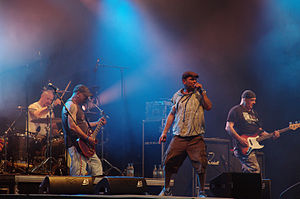The Cockney Rejects
| Cockney Rejects | |
|---|---|

Cockney Rejects 2013
|
|
| Background information | |
| Also known as | The Rejects |
| Origin | East End of London, England |
| Genres |
Punk rock Oi! Street punk |
| Years active | 1978–present |
| Website | www.cockneyrejects.com |
| Members | Jeff Geggus Mick Geggus Vince Riordan Andrew Laing |
| Past members | Chris Murrell Paul Harvey Andy Scott Nigel Woolf Ian Campbell Keith Warrington Nobby Cobb Micky Burt Tony Van Frater |
Cockney Rejects are an English punk rock band that formed in the East End of London in 1978. Their 1980 song "Oi, Oi, Oi" was the inspiration for the name of the Oi! music genre. The band members are loyal supporters of West Ham United, and pay tribute to the club with their hit cover version of "I'm Forever Blowing Bubbles", a song traditionally sung by West Ham supporters.
Cockney Rejects were formed in 1978 by brothers Jeff and Micky Geggus, with their brother-in-law Chris Murrell on bass and Paul Harvey on drums. Their first demo, "Flares n' Slippers", caught the attention of Small Wonder Records owner Pete Stennett, who introduced the band to Bob Sergeant. With Sergeant, they recorded their single "Flares n' Slippers", which sold out its first pressing. Murrell and Harvey were then replaced by Vince Riordan on bass and Andy Scott on drums, from fellow East End London band, The Tickets. This became known as Cockney Rejects' classic lineup, and its debut at the Bridge House in Canning Town in June 1979 is considered a turning point for the band. In September of that same year, the band signed with EMI and released their album Greatest Hits, Vol. 1 in February 1980.
Their biggest hit single in the United Kingdom, 1980's "The Greatest Cockney Rip-Off", was a parody of Sham 69's song "Hersham Boys". Other Cockney Rejects songs were less commercial, partly because they tended to be about hard-edged topics such as street fighting or football hooliganism. Other singles to appear in the UK were "Bad Man," "We Can Do Anything," "I'm Forever Blowing Bubbles " and "We Are the Firm" — all from 1980.
...
Wikipedia
